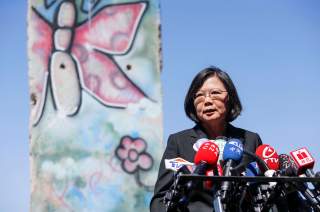Trade Tussle: America Needs to Capitalize on Its Relationship with Taiwan
Washington should negotiate a free trade agreement with Taipei.
But this strategy has holes.
First, if Washington wants to help the DPP win Taiwan’s elections, there is not enough time to wait for America and China to first hammer out their own agreements.
Second, even if the United States delays or skips a free-trade agreement with Taiwan, China is still unlikely to cease all intellectual property theft, adopt all requested fair-trade practices, or force North Korean denuclearization.
Beijing steals intellectual property and manipulates trade in order to leapfrog to economic and military superiority in the region. As long as China is playing catchup and competing to dominate Asia, Beijing is unlikely to give up all such lucrative misconduct. Indeed, Washington just increased tariffs on Beijing and their trade talks ended without a deal. This happened after the United States accused China of “retreating” from its earlier commitments. Now both sides are threatening more tariffs and blacklisting each other’s companies, thereby forcing more businesses to shift their production outside of China. If Beijing ever offers to meaningfully reform its predatory practices (and whether those reforms will be verifiable and irreversible), it will be to end Washington’s escalating trade war with Beijing, not because of Washington’s inaction on Taipei. China is especially sensitive to commercial pressure because its unelected leaders rely on immense growth to maintain their power, but its economy is expected to grow at its slowest rate in almost thirty years.
Similarly, Washington will not convince Beijing to sanction Pyongyang hard enough to force it to denuclearize, because that pressure would risk regime collapse followed by a unified Korea that is allied with America. China fears that prospect more than the possibility of North Korea attacking it. Indeed, each year, the United Nations details North Korea’s violations of Security Council sanctions, including Pyongyang’s procurement of products that keep the Kim regime intact. Those reports identify China as a top accomplice in North Korea’s illicit conduct in the year ending this past February. But such bad press did not deter Beijing, however, as China and North Korea just opened a new border crossing, which signals their plans for greater economic engagement in violation of UN sanctions.
That Beijing would refuse to cooperate with Washington even if Washington limits its support for Taipei is not merely hypothetical. The Obama administration tread lightly with Taiwan, including by withholding new weapons from the island longer than all prior administrations since 1979. President Barack Obama’s administration also publicly criticized Tsai during her presidential run because Washington had “distinct doubts” about her willingness “to continue the stability in cross-Strait relations the region has enjoyed in recent years” when the KMT was in office. Finally, under Obama, Washington also reduced the U.S. naval presence in the Taiwan Strait.
Yet, during this period, China was at its most aggressive, developing powerful offensive weapons. Beijing also broke President Xi’s promises that China would cease economic cyberespionage against America and not militarize its man-made islands in the South China Sea. Besides, if Washington today were to execute a free-trade agreement with Taiwan after China has pledged assistance on commercial and denuclearization matters, Beijing would then use the free-trade agreement to justify backing out of its promises.
It is time for no more excuses—it is time for the United States to strengthen Taiwan’s hand against China, beginning with a free-trade agreement, which will benefit Taiwan no matter how its 2020 elections pan out.
Paul J. Leaf is a regular commentator on U.S. foreign policy. He worked on defense issues for a think tank and is now an attorney at an international law firm.
Image: Reuters

